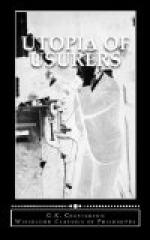The Great Holiday
Now a holiday has no connection with using a man either by beating or feeding him. When you give a man a holiday you give him back his body and soul. It is quite possible you may be doing him an injury (though he seldom thinks so), but that does not affect the question for those to whom a holiday is holy. Immortality is the great holiday; and a holiday, like the immortality in the old theologies, is a double-edged privilege. But wherever it is genuine it is simply the restoration and completion of the man. If people ever looked at the printed word under their eye, the word “recreation” would be like the word “resurrection,” the blast of a trumpet.
A man, being merely useful, is necessarily incomplete, especially if he be a modern man and means by being useful being “utilitarian.” A man going into a modern club gives up his hat; a man going into a modern factory gives up his head. He then goes in and works loyally for the old firm to build up the great fabric of commerce (which can be done without a head), but when he has done work he goes to the cloak-room, like the man at the club, and gets his head back again; that is the germ of the holiday. It may be urged that the club man who leaves his hat often goes away with another hat; and perhaps it may be the same with the factory hand who has left his head. A hand that has lost its head may affect the fastidious as a mixed metaphor; but, God pardon us all, what an unmixed truth! We could almost prove the whole ease from the habit of calling human beings merely “hands” while they are working; as if the hand were horribly cut off, like the hand that has offended; as if, while the sinner entered heaven maimed, his unhappy hand still laboured laying up riches for the lords of hell. But to return to the man whom we found waiting for his head in the cloak-room. It may be urged, we say, that he might take the wrong head, like the wrong hat; but here the similarity ceases. For it has been observed by benevolent onlookers at life’s drama that the hat taken away by mistake is frequently better than the real hat; whereas the head taken away after the hours of toil is certainly worse: stained with the cobwebs and dust of this dustbin of all the centuries.




